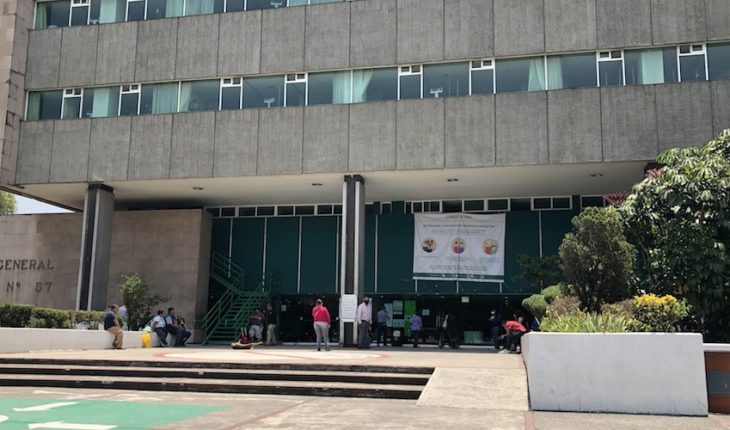Rosa, whom we will call this way to reserve her identity, arrived on Friday at IMSS Zone 57 General Hospital. The woman contains the pain in her stomach that forces her to frown and almost bend as her husband talks to the policeman at the emergency room.
The woman says they go three times in the last 12 hours when she evacuates with blood, a blackish and abundant blood.
Read more: Sheinbaum warns about increase in serious hospitalizations by COVID-19 on CDMX
The policeman has asked them to wait and the husband tells Animal Politician that in case of emergency they get Regional General Hospital 72, but that they were sent here.
“They told me they can’t get it there because that one has already become a COVID hospital and the other emergencies are channeling them to other hospitals.” The policeman comes back and asks for the reference sheet. Marcos extends it and the doors open for Rosa to enter.
But, Teresa (not her real name), one of the doctors at this hospital, says that many more patients will not be able to receive from other institutions. “We are receiving referrals from seven hospitals, all non-COVID cases, and although only emergencies are being taken care of, we will not be able to enter many more, this is going to collapse,” he warns.
The Mexican Social Security Institute (IMSS) announced in a statement that it will reschedule surgeries and specialty consultations during Phase 3 of the health emergency by COVID-19, to reduce contagion, high demand for hospitalization and thereby ensure greater number of beds available in the care of respiratory infections.
IMSS medical-surgical emergency services will continue to serve eligible in most hospitals; In addition, to expedite care, support for emergency surgery cases, as announced by the Presidency of the Republic, says with private hospitals.
Private hospitals have already entered the remove since this Thursday and although they are supposed to attend to other types of emergencies other than COVID-19, there are patients who are turning to them.
Martha, whom we’ll call that to reserve her identity, arrived this morning with her husband at ABC Observatory Hospital. 14 days ago, the lord started with symptoms of respiratory illness, but at the Toluca General Hospital of ISSSTE, in Metepec, Mexico, which he went to, he was told that his condition did not merit hospitalization and he was sent home.
The gentleman got worse until he started with breathing problems. Marta took him back to ISSSTE. In the ER they were told they would evaluate him, but they passed hours and received no care, so the woman called a relative who works at ABC Hospital, the relative told her to go there, taking advantage of the government’s agreement with private hospitals.
And Marta took her husband. He had to leave a 680 peso deposit but they received it, they took him sample for the COVID-19 test and they took him in. The lady doesn’t know if they’re going to charge you more or when they’re going to give you the results.
For now, just wait sitting in one of the mojoneras at the main entrance of this hospital, which on other days looks like a constant coming and going of people and cars, but today, in phase 3 of COVID-19, at least outside, it is desolate.
“My husband is in intermediate therapy, he’s not intubated or anything, maybe that’s why they got him, but we can’t see him, since he came in he’s isolated,” Martha says.
Another private, the Spanish Hospital has a sign at the entrance announcing that there is no more space to receive COVID-19 patients.
Is it time to get the stamps out @lopezobrador_? pic.twitter.com/u3tkKDazLs
— CLAUDIA is CLAUDIA (@panaclo) April 24, 2020
“We have exceeded our ability to care for COVID-19 patients so we don’t have beds available,” the sign says.
In an interview for the program Atando Cabos de Denise Maerker in Radio Formula, Jaime Fandiño, head of the Otolaryngology and Head and Neck Surgery Service, of the Spanish Hospital, explained that in the last 48 hours they have had a significant influx of COVID-19 patients who arrive very severe, in need of support from a fan.
“The intensive therapy area is already full, and although there is still room in intermediate therapy, we could not, out of responsibility, receive a patient who can worsen, as is happening, in 4, 6 or 12 hours and require the support of a ventilator,” he said.
On other conditions, Fandiño noted that they had 100 beds, as part of the agreement with the government to provide care to non-COVID-19 patients who cannot receive in public institutions.
“I don’t have the number of how many we have, but there has been an influx since this Thursday, although in that part we are giving ourselves without any problem.”
The manager mentioned that among the people receiving are pregnant women and assured that even the first C-section of a patient referred by a public hospital has already been made.
Other institutions barely prepared to enter the removing part in this part, such as the Angeles Hospital of Rome, where it will be until Monday that they begin to give care to pregnant women referred by public hospitals, as told by a doctor who asked to reserve her name.
What we do in Animal Político requires professional journalists, teamwork, dialogue with readers and something very important: independence. You can help us keep going. Be part of the team.
Subscribe to Animal Político, receive benefits and support free journalism #YoSoyAnimal.





